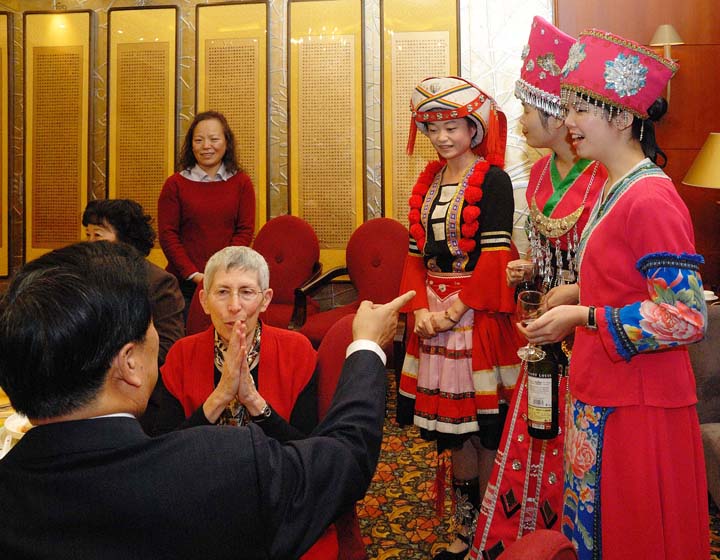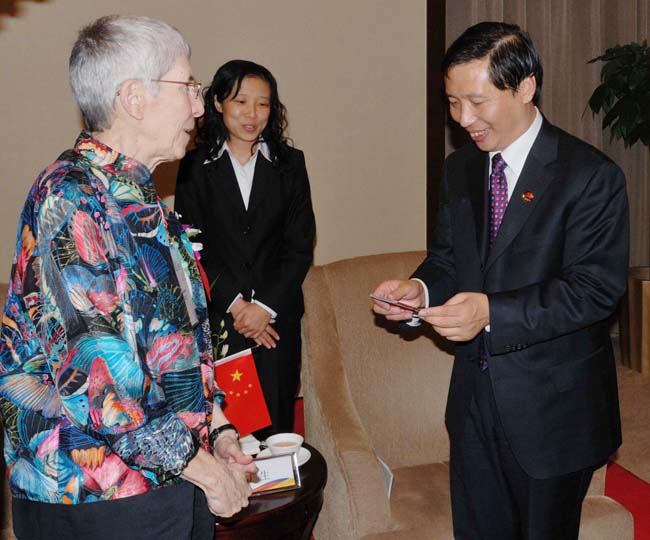Chris Cordner moved from California to Maine and gave up a scholarship to another school because the University of Maine at Farmington has a long-established Chinese exchange program with the Beijing University of Technology.
This year, Cordner, an international studies major at UMF, is racing to learn Chinese in classes taught by a visiting professor from BJUT.
By next fall, Cordner plans to be studying in Beijing, China’s burgeoning capital city of 22 million people, and attending classes with 23,000 other students at BJUT.
“It will definitely be an eye-opener,” the 22-year-old said. “The food, the culture, the people are so different. It probably will be scary at first, but in a good way. I think it will be fun.”
UMF officials are betting that others will feel the same way and are taking steps to greatly expand the only for-credit Chinese language instruction and exchange program in the University of Maine System.
Within a few years, they plan to grow the program to serve a much larger and broader range of students and professors in both countries. They also hope to establish the state’s first Confucius Institute as a center for Chinese language and culture, to serve schools, businesses and communities across Maine and beyond.
They see great potential for shared benefits as China’s economy, population and culture continue to grow and its government, schools and people reach out to other parts of the world to address their rapidly changing needs.
UMF officials plan to capitalize on the university’s 20-year relationship with BJUT and develop new programs with other schools and institutions in China and the United States.
“We can’t stay in our little state of Maine and expect the world to be the way it’s always been, because it’s not,” said UMF President Theodora Kalikow.
“The world is changing, and we need to be a part of it. They’re reaching out because they see the need to have more connections with the world, and we hope to meet them.”
Last month, Kalikow led a five-member delegation to BJUT to celebrate its 50th anniversary and to firm up plans to expand their exchange program.
Over the last 20 years, BJUT has hosted 12 faculty members and about 40 students from UMF, while UMF has hosted 21 faculty members and about 30 students from BJUT, according to April Mulherin, UMF spokeswoman.
During the two-week trip, which was largely financed by BJUT, UMF officials also visited Fudan University in Shanghai and Hangzhou Normal University to cultivate future student and faculty exchanges.
By next fall, UMF expects to welcome 10 Fudan students and faculty members, who want to study English language and literature, and several Hangzhou faculty members, who want to study the American educational system, said UMF Provost Allen Berger.
UMF also has an agreement with Guangxi Medical University in Nanning City, which will start sending students to Farmington in the fall of 2012 to study rehabilitation services such as occupational therapy and substance abuse counseling.
The Chinese students will complete the last two years of a four-year degree at UMF, which plans to graduate 20 Guangxi medical students each year.
UMF stands to benefit financially because the Chinese students will pay out-of-state tuition, which is nearly $17,000 per year and more than double the amount paid by Maine residents.
NEED FOR SOCIAL SERVICES
Chinese officials have a strong interest in developing social service programs such as rehabilitation services, because the extended family has all but disappeared in China since the one-child-per-couple policy started in the late 1970s, Berger said.
“Young people in China today grow up without brothers or sisters, aunts, uncles or cousins,” said Berger, an anthropologist. “It’s a demographic revolution that has led to a cultural revolution. People no longer have family members they can count on in times of need. As a result, China faces a great challenge to develop a social service network nearly overnight.”
Many Chinese students want to study in the United States because getting into a Chinese university is highly competitive, said Suzanne Fox of Fox Intercultural Consulting Services in Portland. They also want to polish their English skills and study management, economics, technology and other subjects in the more creative and often smaller classes offered at American universities.
“We know higher education in the U.S. is the best in the world,” said Furong Wang, a Chinese language professor from BJUT who is teaching at UMF this year. “Teaching students to be creative is very important in China today.”
BENEFITS FOR BOTH
For centuries, Chinese education has focused on memorizing information and practicing skills. The question Chinese educators asked Kalikow most often last month was, “How do you teach creativity? They don’t know how to do it, and they know they don’t know. We have to realize that’s an advantage we have, and we need to share it.”
What’s lacking in the United States is foreign language education, Kalikow and others said. Experts say languages are easiest to learn before age 6 or 7, which is when Chinese children study English. But many U.S. schools struggle to keep foreign languages in the regular curriculum and few teach Chinese.
UMF officials want to change that, Berger said. They hope to send several students in the university’s acclaimed teacher education program to China next fall. They would do their student teaching at an American-style high school in Shenzhen started recently by eastern Maine’s Lee Academy. Five UMF students will be teaching this spring at a high school that Lee established this year in Daegu, South Korea.
“We want to graduate more students who have more familiarity with other parts of the world,” Berger said. “We need to recognize that development of language ability is a critical element of work force development. Because today, if all you can speak is English, you can travel anywhere and you can buy anything, but you can’t sell a damn thing.”
MORE COURSES AT UMF
UMF officials want to expand Chinese course offerings beyond language and culture classes, Berger said. They’re making a point to fill faculty positions with people who have some experience with China.
Advertisements for current openings in the anthropology and sociology departments seek professors who have taught or done research in China.
If the Chinese program grows as UMF officials hope, the university would eventually add a permanent Chinese faculty position, Berger said. UMF currently offers two or three Chinese language or culture courses each semester, which serve 60 to 80 of the university’s 2,000 students each year.
UMF also has applied to start a Confucius Institute sponsored by the Chinese government, which started opening institutes in 2004 to promote Chinese language and learning around the globe. There are 62 Confucius Institutes and 38 Confucius Classrooms across the United States.
RESOURCE FOR MAINE
A Confucius Institute at UMF would be a resource for students, teachers, business owners and community members across Maine, Berger said. The institute would offer workshops and professional development classes, sponsor cultural events and exchanges in Maine and host a variety of teaching and learning opportunities in China.
The Chinese government would contribute $100,000 to operate the institute, covering a director’s salary and benefits, Berger said. UMF officials are seeking additional outside funding to endow the institute because the state likely can’t contribute, given the current budget crisis.
“Money is tight,” Berger said. “We’re working on growing in a creative way.”
If UMF succeeds in starting a Confucius Institute and expanding its Chinese program as planned, it will probably change the way people outside Maine see the university and the state.
“It would open up the possibility of more people from other places coming here for the Chinese program,” said Cordner, the UMF junior who’s heading to China next fall. “Just because the university and the whole state will seem less closed and more culturally diverse.”
Staff Writer Kelley Bouchard can be contacted at 791-6328 or at:
kbouchard@pressherald.com
Send questions/comments to the editors.




Success. Please wait for the page to reload. If the page does not reload within 5 seconds, please refresh the page.
Enter your email and password to access comments.
Hi, to comment on stories you must . This profile is in addition to your subscription and website login.
Already have a commenting profile? .
Invalid username/password.
Please check your email to confirm and complete your registration.
Only subscribers are eligible to post comments. Please subscribe or login first for digital access. Here’s why.
Use the form below to reset your password. When you've submitted your account email, we will send an email with a reset code.